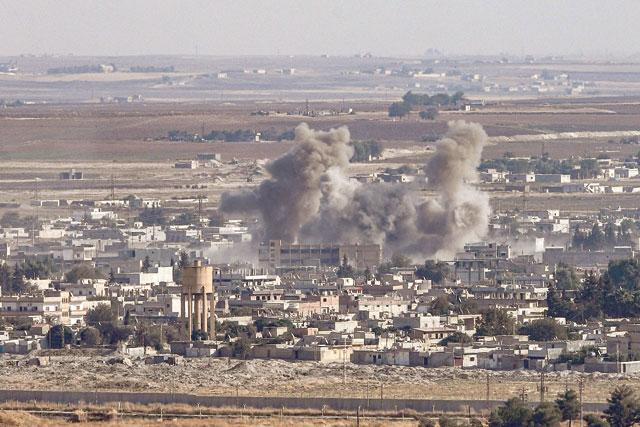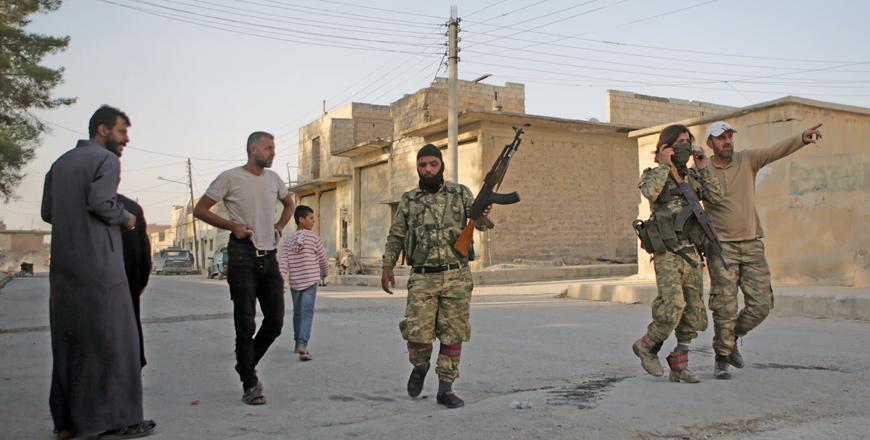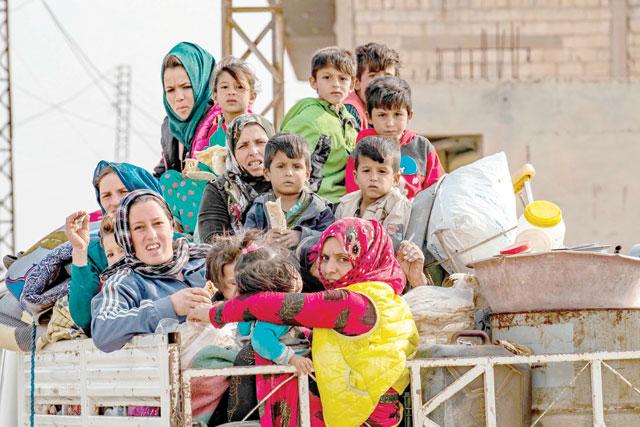You are here
Syria troops sent north to 'confront' Turkey attack — state media
By AFP - Oct 13,2019 - Last updated at Oct 13,2019

This photo taken on Sunday from the Turkish city of Ceylanpinar shows smoke rising from the Syrian border town of Ras Al Ain as fighting rages along the border on the fifth day of a Turkish offensive in Syria (AFP photo)
DAMASCUS — The Syrian army has sent troops to "confront the Turkish aggression" in the north of the country where Ankara is battling Kurdish-led forces, the state news agency SANA said Sunday.
"Syrian ... army units move north to confront Turkish aggression on Syrian territory", SANA said, without giving further details.
The report came as a Kurdish official said on condition of anonymity that "negotiations" were under way between the Kurds and the Damascus government.
"All the options are being examined in the face of the Turkish offensive", the Kurdish official said.
"The [Damascus] government must assume its responsibilities to confront the aggression".
On Sunday, Turkish forces and their proxies pushed deeper into Syria, on the fifth day of the offensive, as Washington announced it was withdrawing its 1,000 troops from the country's north.
Fighting raged, but Turkish-backed forces made significant progress along the border, despite an international outcry over the operation which has left dozens of civilians and fighters dead and displaced tens of thousands.
Marginalised for decades, Syria's minority Kurds carved out a de facto autonomous region across some 30 per cent of the nation's territory after the devastating war broke out in 2011.
After the Daesh terror group swept across the region in 2014, the Kurd-led Syrian Democratic Forces (SDF) mounted a fierce defence of their heartland and became the US-led coalition’s main partner on the ground.
At the end of 2018, as Ankara threatened to launch an operation against Kurds in Syria, the People’s Protection Units (YPG) which dominated the anti-Daesh coalition, urged the Syrian army to deploy around the northern city of Minbej and announced their withdrawal from there.
At the time the army deployed around Minbej, but did not enter the city.
Ankara considers the YPG “terrorists” linked to insurgents inside Turkey.
Meanwhile, the Kurdish administration in northern Syria said that Turkish bombardment near a camp for the displaced led to nearly 800 relatives of Daesh members fleeing.
US Defence Secretary Mark Esper said on Sunday that President Donald Trump had ordered the withdrawal of up to 1,000 troops from northern Syria.
“I can’t give a timeline because it changes hourly. We want to make sure that we do so in a very safe, deliberate manner,” he told the CBS network.
“And at this point in time in the last 24 hours we learned that they [Turkey] likely intend to expand their attack further south than originally planned and to the west.”
Turkey’s President Recep Tayyip Erdogan himself, shrugging off the threat of sanctions, said the aim was to establish a “security zone” that would extend 30 to 35 kilometres into Syria and run from the Euphrates River to the Iraqi border, a stretch of almost 500 kilometres.
Trump has been accused of abandoning a loyal ally in the fight against Daesh after ordering American troops to pull back from the border, which Ankara took as a green light to move in.
The Syrian Observatory for Human Rights said at least 26 civilians were killed on Sunday in northeast Syria, including an unidentified journalist who died in a Turkish air strike on a convoy of vehicles transporting civilians and journalists.
At least 60 civilians have now died in violence on the Syrian side of the border, with Turkish reports putting the number of civilians dead from Kurdish shelling inside Turkey at 18.
The Observatory monitoring group said pro-Ankara fighters “executed” at least nine civilians on Saturday near the Syrian town of Tal Abyad.
The Kurds said a female Kurdish party official and her driver were among those killed.
Camp guards attacked
Aid groups have warned of another humanitarian disaster in Syria if the offensive is not halted.
The UN humanitarian agency OCHA said the exodus sparked by the fighting had grown to 130,000 people and it was preparing for that figure to more than triple.
“We have moved into a planning scenario where up to 400,000 people could be displaced within and across the affected areas,” spokesman Jens Laerke told AFP.
Some 12,000 Daesh fighters — Syrians, Iraqis as well as foreigners from 54 countries — are detained in Kurdish prisons, according to official Kurdish statistics.
Displacement camps meanwhile host some 12,000 foreigners — 8,000 children and 4,000 women.
“The brutal military assault led by Turkey and its mercenaries is now taking place near a camp in Ain Issa, where there are thousands [of people] from families of Daesh,” a Kurdish administration statement said.
“Some were able to escape after bombardments that targeted” the camp. The Kurds also charged its guards had been attacked and the gates of the camp flung open.
It said the Ain Issa camp was “now without guards” and 785 relatives of Daesh extremists had fled.
According to Turkish media, Ankara aims to take control of a territory 120 kilometres long and 30 kilometres into Syria, up to the towns of Tal Abyad and Ras Al Ain.
Turkish forces and their proxies captured Tal Abyad on Friday afternoon, which left Ras Al Ain, further east, as the last major target in the offensive.
Turkey announced it had seized the key M4 highway, which looks like it might mark the southern limit of its advance in this initial phase of the invasion.
It lies 30 to 35 kilometres deep in Syrian territory.
Arab League chief Ahmed Aboul Gheit on Saturday slammed the Turkish attack as an “invasion of an Arab land” while the ministers they would consider diplomatic and economic action against Ankara.
Related Articles
QAMISHLI, Syria — Hundreds of relatives of foreign militants escaped from a displacement camp in northern Syria, Kurdish authorities said on
RAS AL AIN, Syria — The Kurdish-led Syrian Democratic Forces (SDF) fully withdrew from a Turkish-encircled town in northern Syria on Sunday,
TALL TAMR, Syria — Syria's Kurds battled to hold off a Turkish invasion on Thursday as thousands of civilians fled air strikes and shelling



















